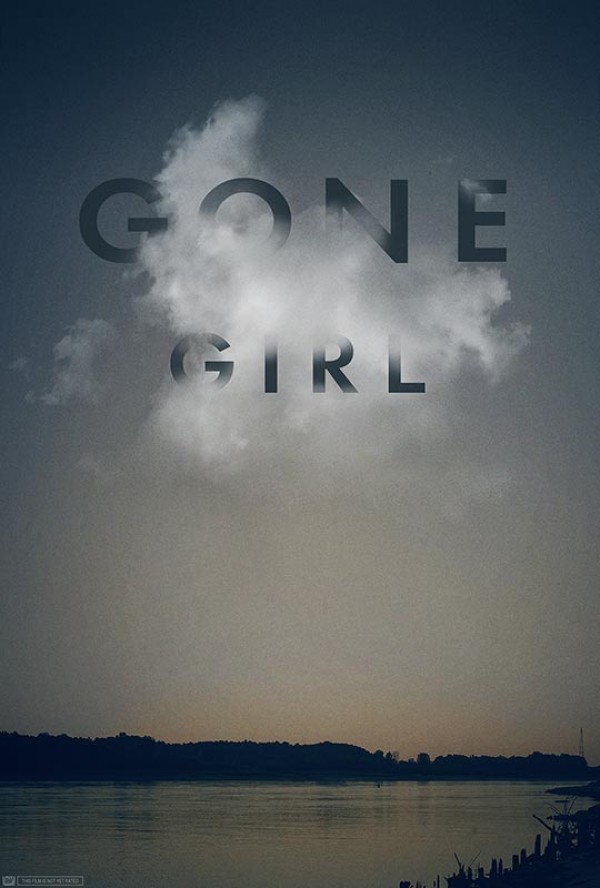GONE GIRL (2014, directed by David Fincher, 149 minutes, U.S.)
 BY DAN BUSKIRK FILM CRITIC At the opening of director David Fincher’s new adaptation of Gillian Flynn’s best-selling thriller, Nick Dunne looks at his sleeping wife Amy while his voice-over wonders what’s going in in that noggin of hers. It takes us almost two-and-a-half hours to answer that question and although Gone Girl is a sometimes-diverting Hollywood thriller the questions that linger center on the once-rising career of Mr. Fincher. Is this sort of gussied-up Lifetime Network potboiler really worthy of one of Hollywood’s most-talented directors? With Gone Girl we see that the Kubrick-like sense of frigid satire has slowly and inexplicably dumbed down to the empty gloss of Adrian Lyne, perhaps an irrelevant distinction in the modern film market.
BY DAN BUSKIRK FILM CRITIC At the opening of director David Fincher’s new adaptation of Gillian Flynn’s best-selling thriller, Nick Dunne looks at his sleeping wife Amy while his voice-over wonders what’s going in in that noggin of hers. It takes us almost two-and-a-half hours to answer that question and although Gone Girl is a sometimes-diverting Hollywood thriller the questions that linger center on the once-rising career of Mr. Fincher. Is this sort of gussied-up Lifetime Network potboiler really worthy of one of Hollywood’s most-talented directors? With Gone Girl we see that the Kubrick-like sense of frigid satire has slowly and inexplicably dumbed down to the empty gloss of Adrian Lyne, perhaps an irrelevant distinction in the modern film market.
After 2011’s underwhelming take on the similarly best-selling The Girl with the Dragon Tattoo, Fincher has brought his visual talents to another glossy murder mystery. Set in a tiny Midwest college town, Amy and Nick Dunne (played by future-Batman Ben Affleck and little-known British actress Rosamund Pike) are a pair of big city writers who are left unemployed by the recession. They end up relocating to Nick’s little hometown where he teaches and co-founds a bar with his twin sister Margo (Carrie Coon) while Amy struggles to find her place. On the couple’s five-year anniversary, Nick comes home to find Amy gone, with a smashed glass coffee table hinting that she has been a victim of foul play. Nick only gets to assume the role of the concerned spouse in the press for a brief moment before detectives start to dig in and investigate whether the Dunnes were really the loving couple that Nick says they were.
Once Amy’s diary is found, her narrative starts to muddy the story Nick has told. Amy has become disillusioned with who Nick has become. The pair’s finances are more dire than Nick has let on and Amy’s desire for children has led to physical confrontations. Once it is revealed that Nick has been sleeping with one of his college writing students, the press and even Nick’s sister begin to paint a picture of Nick as a murderous spouse. Like one of Hitchcock’s “Wrong Men,” Nick can do nothing but sputter about his innocence as the local detectives circle closer and closer.
Fincher directs the proceeding with the appropriate big-budget gloss but for a director once known for his visual flair his work here is pretty mundane. Fincher seems a slave to the style a director might learn from Police Procedural 101: crime scene, clue, character response and fade. Fincher’s gift with actors remains intact (Rosamund Pike gives a star-making performance as the unhappy and duplicitous Amy) but Fincher seems overly-committed to remaining true to the many details of the novel. At times Gone Girl feels like a distillation of a modern cable TV show as much as a creation for the big screen. Unfortunately a plodding pace (something Fincher has struggled with in films like Zodiac and Benjamin Button) dogs the film through much of its middle. By then we know that the Nick can’t be the red herring AND the killer and in crime fiction missing bodies have a way of turning up alive. At 149 minutes, Gone Girl has plenty of time to let the mystery go slack and sadly it ultimately does.
Ben Affleck is an actor audiences seem to tolerate rather than enjoy and all the repetitive “I didn’t do it!” scenes are enough to try one’s patience with the film. A more-nuanced script might have allowed Nick to show a truly unlikable side but Affleck’s Nick has his indiscretions and flaws written off as silly human weakness. Nick seems unfairly pressured by the women around him and the only lady he can trust is his ever-loving twin sister. Watch the brief scenes with the student Nick seduced; despite the situation her character is never given a moment of sympathy, something that might have dented the luster of Nick “aw-shucks” charm. It’s that sort of discomfort with ambiguity that runs deep in the film’s script and direction and it keeps Gone Girl slogging ankle-deep in shallow water. (Somewhere in here I should mention the humor, which is worthy of a black-humored giggle even if TV crime journalism is in general too grotesque for casual parody).
The third act reveals the shocking answers and allows the film to end with a bleak punch but at the same time the finale’s complete unbelievability undercuts the film’s idea’s concerning intimate deception and the private narratives we carry in our heads. Fincher’s innate skills make Gone Girl go down agreeably enough but ultimately reinforces our doubts that the man who directed such vivid visual extravaganzas like Seven and Fight Club is not the boundary-pushing talent he once appeared to be. Like the film’s dueling spouses, I’m a little disillusioned too.

